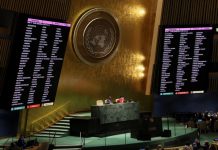On the eve of the anniversary of his re-election which are widely believed to have been rigged, Belarusian ruler Alexander Lukashenko was threatened by the European Union with additional sanctions.
“The EU stands ready to consider further measures in light of the regime’s blatant disregard of international commitments,” EU foreign policy chief Josep Borrell said on Sunday.
With the “forced and unlawful” landing of a Ryanair flight in May and the instrumentalisation of migrants for political purposes, the regime has “further challenged international norms,” Borrell added.
Borrell was alluding, among other things, to the fact that more than 2,000 illegal crossings were registered at the border of EU member Lithuania with Belarus in July alone.
From the EU’s point of view, this is being done deliberately by the government in Minsk. Lukashenko had openly threatened to allow people from countries such as Iraq, Afghanistan or Syria to cross the border in response to the EU sanctions.
The EU statement was published on the anniversary of the presidential election in Belarus on August 9 last year.
Despite massive accusations of electoral fraud, Lukashenko was declared the winner with 80.1 per cent of the votes.
Mass protests following the elections were put down with violence.
The EU no longer recognises Lukashenko as president and has already imposed sanctions in recent months due to the repression of civil society and the democratic opposition in Belarus.
Most recently, there were also economic sanctions following the arrest of the anti-government blogger Roman Protasevich. Authorities in Belarus forced a Ryanair passenger plane on its way from Athens to Vilnius in Lithuania to make a stopover in Minsk to arrest the Protasevich.
At the moment, nobody can feel safe, including me,” Svetlanto Tikhanovskaya, opponent of Lukashenko, who now lives in exile in Lithuania, said. She mentioned the case of Belarusian activist Vitaly Shishov, who was recently found dead in Ukraine, where he lived in exile.
The situation of Belarusian Olympic athlete Kristina Timanovskaya also showed that anyone could be a victim of Lukashenko’s “repressive apparatus.”
The track and field athlete fled to Poland after she said she was to be kidnapped from the Tokyo Olympics for criticising Belarusian sports officials.
Later on Sunday, the German foreign minister pledged to support the country’s democracy movement.
Foreign Minister Heiko Maas said the whole country was being held “hostage” by Lukashenko, according to a ministry statement.
“Alongside political support, we have launched practical assistance with our Belarus civil society action plan to support people who are being politically persecuted,” he said.
“Led by courageous women like Svetlana Tikhanovskaya and Maria Kolesnikova, people walked, and still walk, the streets of the country peacefully protesting against state violence.”
Kolesnikova, an opposition activist who had worked as a cultural manager in Stuttgart for many years, is now a political prisoner, jailed alongside more than 600 other government critics.
“Their protest, their will to persevere is met with admiration, solidarity and support worldwide,” Maas said.
On Sunday, Hundreds of people, among them many Belarusians living in exile in Poland, marched in Warsaw to protest political repression of Lukashenko’s regime, in neighbouring Belarus.
Many waved the Belarusian opposition’s red-and-white flag on Polish soil, which is banned in Belarus, and chanted “Long live Belarus!”
The protest focused on the Aug. 9, 2020 presidential election in Belarus in which President Alexander Lukashenko was awarded a sixth term in a vote that the opposition and many in the West view as fraudulent.
In response, a mass protests was triggered in Belarus that led to increased repression by Lukashenko’s regime on protesters, dissidents and independent media.
Over 35,000 people were arrested and thousands were beaten and jailed.
Lukashenko has earned the nickname of “Europe’s last dictator” in the West for his relentless repression of dissent since taking the helm in 1994.
Warsaw march was held as a sign that Belarusians in Poland will not give up their fight to bring change to Belarus, said the organizers. Among their demands was the release of political prisoners back home, they added.









